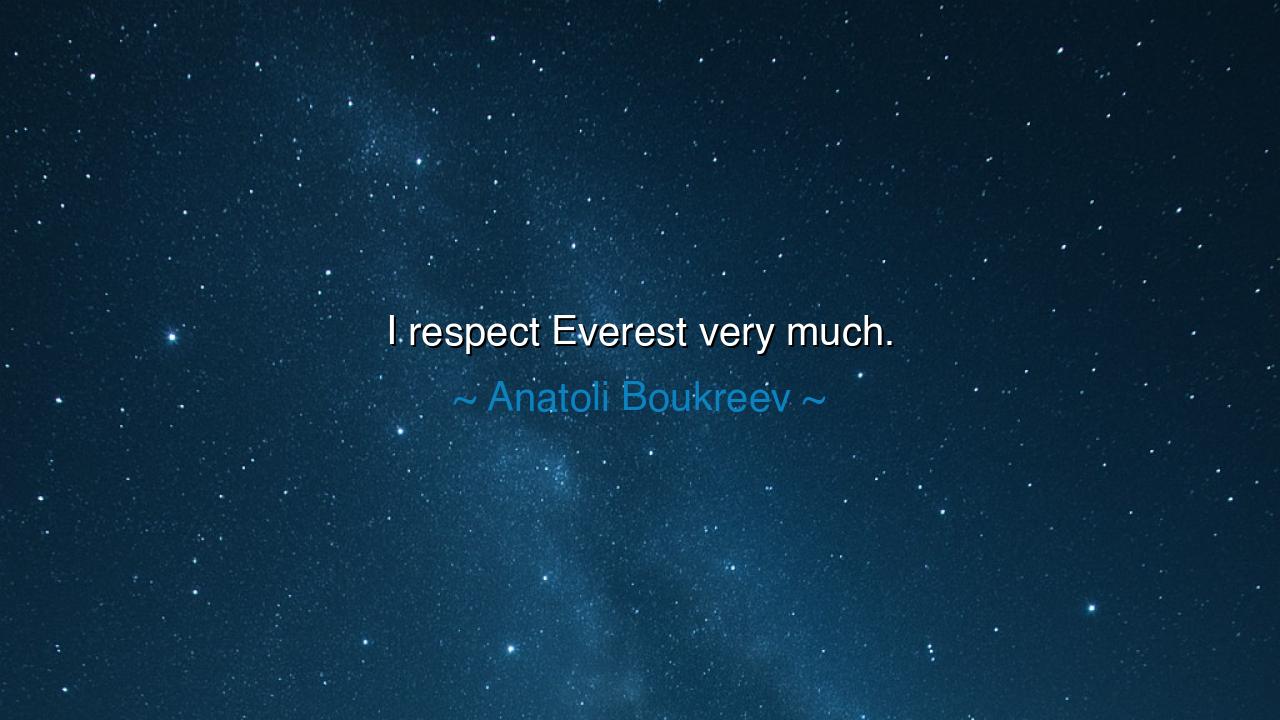
I respect Everest very much.






Hear the solemn words of Anatoli Boukreev, mountaineer of iron will and quiet spirit: “I respect Everest very much.” At first these words seem simple, almost plain, yet within them lies the weight of mountains and the wisdom of one who gazed upon the highest peak of earth and knew its power. For Boukreev, who lived and died among summits, Everest was not a conquest, not a prize, but a force to be revered—a vast cathedral of ice and stone where human pride is swiftly humbled.
The meaning of this statement is profound. To say respect is not to say fear, nor to say worship. It is to acknowledge limits, to bow before something greater than oneself, while still daring to approach it with courage. Boukreev knew that many who came to Everest were consumed by ambition, seeking glory, wealth, or fame. But to him, the mountain was not an enemy to be slain, nor a stage to display one’s might—it was a sovereign presence, demanding humility. In respecting Everest, he respected life itself, and the razor’s edge upon which every climber walks.
The origin of his words is bound to his own story, a tale of both triumph and tragedy. Boukreev was among the climbers caught in the infamous 1996 Everest disaster, where storms claimed the lives of many. Yet he descended into the blizzard three times to rescue stranded climbers, braving the mountain’s wrath when others despaired. His respect for Everest did not paralyze him; it sharpened his understanding of its danger, and gave him the clarity to act. When he said, “I respect Everest very much,” it was not empty sentiment—it was born from intimate knowledge of the mountain’s beauty, its cruelty, and its indifference.
History reminds us that this lesson is not only for climbers. Think of sailors who set out upon the seas. The greatest mariners, from Odysseus to Shackleton, spoke not of mastering the ocean but of respecting it. They knew that arrogance upon the waves leads to shipwreck, but reverence brings survival. Just as Everest will not bow to human will, so too the sea, the desert, and the sky demand humility. Nature is not conquered; it is endured, partnered with, and respected.
Boukreev’s words also shine a light upon human pride. Many treat challenges as enemies to dominate. They seek to bend the world to their will, forgetting that some forces cannot be subdued. In the end, those who scorn respect are broken, while those who carry reverence endure. Everest has claimed the lives of the arrogant and the unprepared, yet those who treat it as Boukreev did—with courage tempered by humility—stand a chance of returning to tell the tale.
The lesson for us is clear: whatever “Everest” you face in life—be it ambition, struggle, or suffering—approach it with respect. Do not dismiss it as small, nor exalt yourself as mighty enough to crush it. Honor the challenge, prepare for it, bow to its scale, but do not shrink back from it. For in balancing courage with humility, you find the path of wisdom.
And so, let your actions follow. When you meet life’s towering mountains, do not stride forward in arrogance, nor retreat in fear. Prepare your heart, respect the challenge, and step forth with strength. Respect is not weakness; it is the foundation of endurance. Just as Boukreev respected Everest and yet climbed into its storms to save others, so too can you respect the hardships of life and yet rise heroically within them.
Thus remember his quiet yet mighty words: “I respect Everest very much.” In them lies the wisdom of all who face forces greater than themselves. To respect is to endure; to endure is to triumph. And those who learn this will find themselves not conquerors of mountains, but companions of their eternal majesty.






AAdministratorAdministrator
Welcome, honored guests. Please leave a comment, we will respond soon